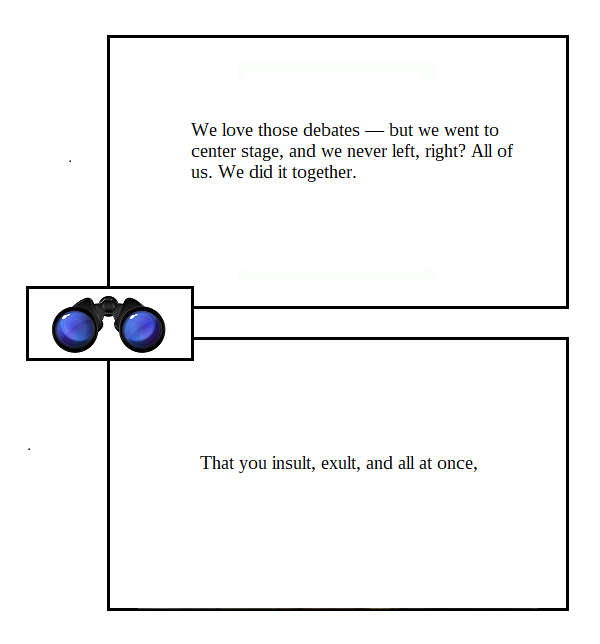Silence as protest and gift
Friday, April 13th, 2018[ by Charles Cameron — on the frayed edges of music ]
.
Silence is the exception rather than the rule — so much so that it’s notable.
**
The bells of York Minster were silenced for a year in protest at the sacking of, as the Guardian eruditely puts it, “30 campanologists”. Bell-ringing is an ancient craft in the UK, mathematical in its combinatoric precision, glorious in its language and literature. Spanning the arts and sciences, it is thus a bridge between the two sides of that academic and popular schism or chasm which CP Snow famously described in his book, The Two Cultures.
**
Mathematics and combinatorics:
The ringing of a peal or complete sequence of bells is a highly mathematized form of music, and the order in which the bells are to be rung — the method — can therefore be transcribed in graphical form:
Oh, the beauty in so musical a score.
I dare not show you a full extent — we might run out of pixels!
**
Language and literature:
Truth (and the detested false), Grandsires, Triple Bob Major, oh, and Spitalfields Festival Treble Bob, and how could one forget Affpuddle Treble Bob Major..
Dorothy Sayers‘ novel The Nine Tailors has nothing to do with bespoke and everything to do with murder most foul — death and detection:
In some parishes in England the centuries-old tradition of announcing a death on a church bell is upheld. In a small village most people would be aware of who was ill, and so broadcasting the age and sex of the deceased would identify them. To this end the death was announced by telling (i.e. single blows with the bell down) the sex and then striking off the years. Three blows meant a child, twice three a woman and thrice three a man. After a pause the years were counted out at approximately half-minute intervals. The word teller in some dialects becomes tailor, hence the old saying “Nine tailors maketh a man”.
The bell used in the novel for the announcement is the largest (tenor) bell, which is dedicated to St. Paul. Hence “teller Paul” or in dialect “tailor Paul”. Sayers is here acknowledging the assistance of Paul Taylor of Taylor’s bell foundry in Loughborough, England who provided her with detailed information on all aspects of change-ringing.
Scientific American adds other details, describing:
another time-honored tradition of bells, which frequently have nicknames and inscriptions, as if they were, indeed, alive.
For instance, in Sayers’ novel, the oldest bell is dubbed Batty Thomas, cast in 1380, and bears the inscription “Abbat Thomas sett mee heare + and bad mee ringe both loud and cleer.” (The oldest bell hung for change ringing that is still in use was cast in 1325; it is the fifth bell at St. Dunstan’s Church in Canterbury, Kent.)
**
Argh, the lockout:
Enough of the beauty of the English bells. From the Guardian piece referenced in the upper panel, above:
But simmering tensions between the minster’s governing body, the Chapter of York, and the ringers came to a head last October when the band was summarily dismissed and locked out of the 15th-century cathedral’s bell tower.
The silencing of the York Minster peal is thus a case of a sacred sound being stilled by a secular — or at least unionized — silence.
**
How opposite, and apposite, then, is the ringing silence offered by the youthful Quakers as a podcast in the second Guardian piece referenced (lower panel, above):
It’s not the most obvious subject for a podcast, but a group of young Quakers in Nottingham have recorded their 30-minute silent meeting so as to share their “oasis of calm” with the world.
In an episode of the monthly Young Quaker Podcast, called the Silence Special, you can hear a clock ticking, pages being turned and the rain falling, as the group meets and sits in silence at the Friend’s Meeting House in Nottingham. [ .. ]
The idea for the silent podcast first came from Tim Gee, a Quaker living in London, who was inspired by the BBC’s season of “slow” radio, which treated audiences to – among other things – the sounds of birds singing, mountain climbing and monks chatting.
Gee said he had wanted to “share a small oasis of calm, and a way to provide a moment of stillness, for people on the move”.
Jessica Hubbard-Bailey, 25, from the Nottingham Young Quakers, who recorded the podcast, said they had jumped at the opportunity to broadcast something “immersive and unusual”. She added: “We have very different ways of worship to most people of faith and we thought this was a really unique opportunity to give people a little slice of what the Quakers do. Also, we are really good at being quiet because we’ve made a practice of it and I think that is of value. These days everyone is so busy, everyone is working all the time, so it’s really valuable to have the opportunity to sit down once a week and just be quiet and listen.”
Listen? Listen to the birds, to the chattering monks — or to the still, small voice?
**
Listen, in any case, to the sound of silence:
Just listen!










